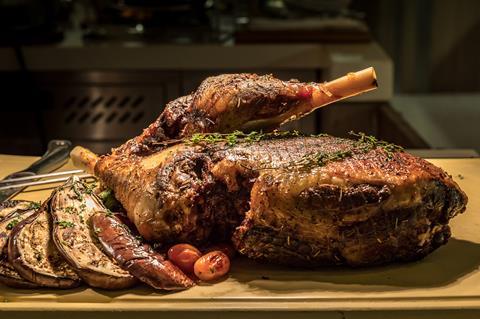According to the latest data from market research firm Kantar, lamb was the most popular fresh meat joint over the Easter period.

Grocery inflation now stands at 3.8% for the four-week period ending 20th April 2025, as take-home sales at the grocers were boosted by Easter falling later in the year, increasing 6.5% over the four-week period.
Head of retail and consumer insight at Kantar Fraser McKevitt commented: “Chocolate confectionery prices rose by 17.4% this period, the fastest of any category, but that didn’t stop the British public treating themselves this Easter.
“The volume of chocolate eggs sold through supermarket tills still grew by 0.4% on last year, while at the dinner table lamb was the most popular fresh meat joint, followed by beef and pork. Some households chose to indulge in less seasonal fare as the sun came out and they dusted off the barbecue, with burger sales shooting up by 31% over the last month.”
Sales increase across supermarkets
Britain’s largest grocer Tesco now has 27.8% of the market as till spend increased 6%. Sainsbury’s saw a sales increase of 4.4%, taking its share to 15.3%.
Lidl experienced sales growth of 10.1%, reaching an 8% market share, while Aldi’s market sales growth of 5.9% means it now holds 11% of the market.
Waitrose’s portion of the market remained stable at 4.5%, while sales at the Co-op grew 1.9% giving it a 5.3% share. Spending on groceries at M&S grew by 14.4% in the 12 weeks to 20th April.
Asda now holds 12.3%, while Morrisons’ sales growth of 1.8% means it has an 8.5% share. Iceland has boosted its sales by 2.0% over the last year, with an overall stake of 2.2%.
Online retailer Ocado was the fastest growing retailer as sales grew by 11.8% compared to a year ago, with the retailer now holding 1.9% of the market.
Scottish butchers adapt to “massive changes”

Gordon King, executive manager of Scottish Craft Butchers (SCB), said sales of lamb and steak pies were very good across UK butchers, with one SCB member stating that they had bought 22 lambs off farm and sold out of everything.
King said that SCB members were still adapting to “massive changes” in not only the supply chain costs but also operating costs such as NI increases. He stated that it was a “period of taking stock and being careful about how to develop and grow businesses going forward”.















